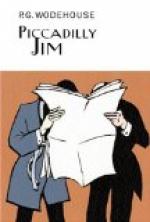“What is it you wish me to explain, sir?”
“Why, the whole thing. What’s it all about?”
“It’s perfectly simple, sir. Surrey won the toss, and took first knock. Hayward and Hobbs were the opening pair. Hayward called Hobbs for a short run, but the latter was unable to get across and was thrown out by mid-on. Hayes was the next man in. He went out of his ground and was stumped. Ducat and Hayward made a capital stand considering the stickiness of the wicket, until Ducat was bowled by a good length off-break and Hayward caught at second slip off a googly. Then Harrison and Sandham played out time.”
Mr. Crocker breathed heavily through his nose.
“Yes!” he said. “Yes! I had an idea that was it. But I think I’d like to have it once again, slowly. Start with these figures. What does that sixty-seven mean, opposite Hayward’s name?”
“He made sixty-seven runs, sir.”
“Sixty-seven! In one game?”
“Yes, sir.”
“Why, Home-Run Baker couldn’t do it!”
“I am not familiar with Mr. Baker, sir.”
“I suppose you’ve never seen a ball-game?”
“Ball-game, sir?”
“A baseball game?”
“Never, sir.”
“Then, Bill,” said Mr. Crocker, reverting in his emotion to the bad habit of his early London days, “you haven’t lived. See here!”
Whatever vestige of respect for class distinctions Mr. Crocker had managed to preserve during the opening stages of the interview now definitely disappeared. His eyes shone wildly and he snorted like a war-horse. He clutched the butler by the sleeve and drew him closer to the table, then began to move forks, spoons, cups, and even the contents of his plate about the cloth with an energy little short of feverish.
“Bayliss!”
“Sir?”
“Watch!” said Mr. Crocker, with the air of an excitable high priest about to initiate a novice into the Mysteries.
He removed a roll from the basket.
“You see this roll? That’s the home plate. This spoon is first base. Where I’m putting this cup is second. This piece of bacon is third. There’s your diamond for you. Very well, then. These lumps of sugar are the infielders and the outfielders. Now we’re ready. Batter up? He stands here. Catcher behind him. Umps behind catcher.”
“Umps, I take it, sir, is what we would call the umpire?”
“Call him anything you like. It’s part of the game. Now here’s the box, where I’ve put this dab of marmalade, and here’s the pitcher, winding up.”
“The pitcher would be equivalent to our bowler?”
“I guess so, though why you should call him a bowler gets past me.”
“The box, then, is the bowler’s wicket?”




